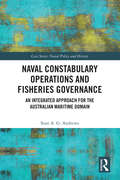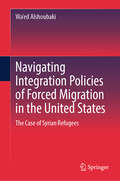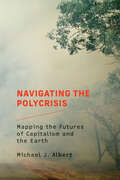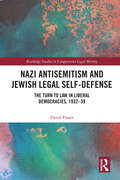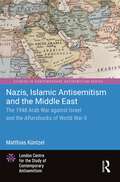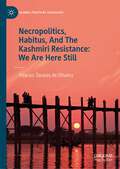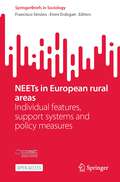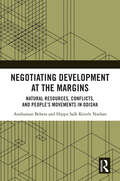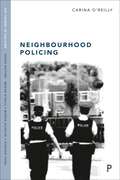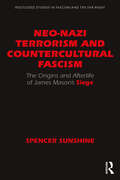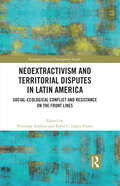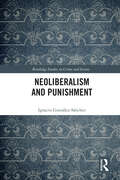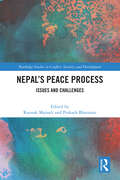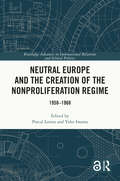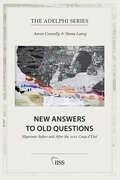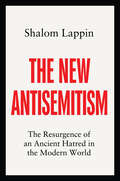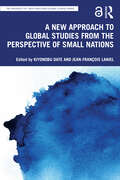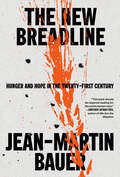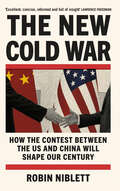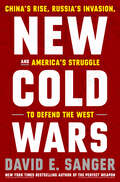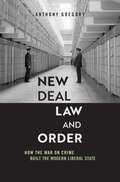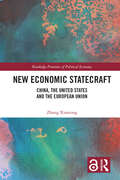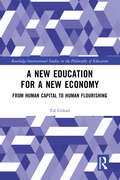- Table View
- List View
Naval Constabulary Operations and Fisheries Governance: An Integrated Approach for the Australian Maritime Domain (ISSN)
by Sean A. AndrewsThis book offers an analysis of naval constabulary operations, in particular Australian fisheries patrols, and challenges the widely accepted Anglo-American school of maritime thought.In the Indo-Pacific, fisheries and the activities of fishing boats are of increasing strategic importance in Australia’s region – Australia’s Four Oceans. Issues of overfishing, population growth and climate change are placing growing pressure on fish as a resource, and in doing so are making fisheries more significant, and significant on a strategic as opposed to simply an economic or environmental level. When, combined with the growing use of fishing vessels as para-naval forces, it is clear that the activities of fishing vessels, whether fishing or not fishing, are matters of considerable strategic relevance. This book illuminates contemporary seapower challenges, explains and defines maritime security and examines and refines existing theory to advance a set of new or refined concepts to help frame the on-water activities of constabulary operations -- reducing the possibility of on-water miscalculation between states.This book will be of much interest to students and scholars of naval studies and sea power, maritime strategy, maritime security and International Relations.
Navigating Integration Policies of Forced Migration in the United States: The Case of Syrian Refugees
by Wa'ed AlshoubakiThis book investigates the integration of Syrian refugees in the United States, and it identifies the challenges that hinder their successful integration. After providing a comprehensive analysis of the U.S. legal instruments in national and international laws and obligations to receive forced migrants, the book then highlights the resettlement process and programs as a coordinated interagency process that entails a collaboration between the UN Refugee Agency and the related U.S. departments and agencies and the nongovernmental partners and refugee advocacy organizations. Moreover, it delves into integration as a proxy theory and governance that entails an analytical component from a theoretical lens to understand some aspects of realities that revolve around the resettlement of forced migrants' concepts, principles, and policies. Built on rich qualitative data from Syrian refugees in the U.S. to understand their resettlement experiences and their integration in multidimensional analysis, the book shows how the lack of federally driven integration policies and institutions in the U.S. negatively affects just integration. Relying on voluntary organizations leads to uneven outcomes among forced migrants, affecting social equity. Alongside this book's theoretical and practical implications, it highlights the ethical consideration of studying forced migrants and the synergy between forced migrants' vulnerability and cultural sensitivity. Ultimately, the book discusses the roadmap for implementing integration policies in the U.S. Among the topics covered: Introduction: The History of Managing Forced Migration in the U.S.: Political Climate and Global Events The U.S. Legal and Institutional Frameworks of the Resettlement of Syrian Refugees The Syrian Refugees' Integration Challenges in the U.S. and the Roadmap for Integration Policies Navigating Integration Policies of Forced Migration in the United States: The Case of Syrian Refugees is relevant reading for researchers who are interested in integration and refugee-related topics; academics who conduct research in social policies, refugee integration, and resettlement; public policymakers who are involved in formulating refugee integration policies; practitioners at various levels who assist resettled forced migrants; and graduate students studying political science, public administration, social work, and sociology. Politicians with left-wing views who are advocating for improved human security for everyone also would find the book a useful resource.
Navigating the Polycrisis: Mapping the Futures of Capitalism and the Earth
by Michael J. AlbertAn innovative work of realism and utopianism that analyzes the possible futures of the world-system and helps us imagine how we might transition beyond capitalism.The world-system of which we are all a part faces multiple calamities: climate change and mass extinction, the economic and existential threat of AI, the chilling rise of far-right populism, and the invasion of Ukraine, to name only a few. In Navigating the Polycrisis, Michael Albert seeks to illuminate how the &“planetary polycrisis&” will disrupt the global community in the coming decades and how we can best meet these challenges. Albert argues that we must devote more attention to the study of possible futures and adopt transdisciplinary approaches to do so. To provide a new form of critical futures analysis, he offers a theoretical framework—planetary systems thinking—that is informed by complexity theory, world-systems theory, and ecological Marxism. Navigating the Polycrisis builds on existing work on climate futures and the futures of capitalism and makes three main contributions. First, the book brings together modeling projections with critical social theory in a more systematic way than has been done so far. Second, the book shows that in order to grasp the complexity of the planetary polycrisis, we must analyze the convergence of crises encompassing the climate emergency, the structural crisis of global capitalism, net energy decline, food system disruption, pandemic risk, far-right populism, and emerging technological risks (e.g. in the domains of artificial intelligence, biotechnology, and nuclear weapons). And third, the book contributes to existing work on postcapitalist futures by analyzing the processes and mechanisms through which egalitarian transitions beyond capitalism might occur.A much-needed work of global futures studies, Navigating the Polycrisis brings together the rigor of the natural and social sciences and speculative imagination informed by science fiction to forge pathways to our possible global future.
Nazi Antisemitism and Jewish Legal Self-Defense: The Turn to Law in Liberal Democracies, 1932–39 (Routledge Studies in Comparative Legal History)
by David FraserOne of the first to provide a socio-legal comparative history of under-studied or ignored Jewish attempts in the 1930s "Anglosphere" to counter the rise in fascist and Nazi antisemitism, this book examines the ways in which Jewish individuals and organized communal bodies in the mid-to-late 1930s sought to counter this increasing antisemitic violence, physical and verbal, by using the law against their fascist and Nazi attackers. This is the first study to explore how Jews in these countries organized themselves, brought their oppressors to court, while seeking to convince their governments that an attack on Jews was a threat to the social order. The book analyzes the networks of knowledge and the personal relationships between and among key actors and institutions of the "Antisemitic International." Nazi "nationalists" always participated in networks that transcended borders. Case studies from Canada, South Africa, the United Kingdom, and the United States, illustrate the ways in which different mechanisms of Jewish resistance were deployed throughout the mid-to-late 1930s. They embody significant concerns about the "turn to law" and the importance of litigation and legislation. Grounded in original archival research on three continents, the book examines the ways in which professional legal discourse about public order and democratic citizenship proffered by Jewish communities and individual Jews was countered by their Nazi opponents with legal and political arguments about "truth," "persecution," and Jewish perfidy. The book will be of interest to students, academics, and researchers working in the areas of Legal History, History, Jewish Studies, the study of Antisemitism, and the History of the far right, fascism and Nazism.
Nazis, Islamic Antisemitism and the Middle East: The 1948 Arab War against Israel and the Aftershocks of World War II (Studies in Contemporary Antisemitism)
by Matthias KüntzelNazis, Islamic Antisemitism and the Middle East demonstrates the impact on the Arab world of Nazi ideology and propaganda in the 1930s and beyond. In 1937, with the brochure "Islam and Judaism," a new form of Jew-hatred came into the world: Islamic antisemitism. The Nazis did everything they could to anchor this new message of hate through their Arabic-language radio propaganda. The book sheds light on this hitherto unknown chapter of Germany's past. It presents new archive findings that show how the image of Jews in Islam changed between 1937 and 1948 under the influence of this propaganda and other Nazi activities. This fresh look at Middle East history allows for a more precise assessment of the present: What exactly is "Islamic antisemitism"? How is it currently manifesting itself in Germany and France? What makes it particularly dangerous? Only when we understand how strongly modern Middle East history is shaped by the aftermath of National Socialism will we be able to correctly interpret the hatred of Jews in this region and its echo among Muslims in Europe and develop adequate countermeasures. This volume will be of interest to those researching antisemitism, Nazi foreign policy and the political history of the Middle East.
Necropolitics, Habitus, And The Kashmiri Resistance: We Are Here Still (Global Political Sociology)
by Vinícius Tavares de OliveiraThis book engages the concept of necropolitics to present a vision of how to understand the physical body as a space of power and resistance to social order, in the context of the Kashmir resistance. The author sheds new light on the relations between India and Pakistan, with a focus on tensions over the Kashmir region, in order to better understand the emergence and stabilization of the narrative that criminalizes and thus justifies the population that rebels against state actions in the region. The research draws from archival and interview research and presents the reader with new insight into both conceptual and material dimensions of necropolitics.
NEETs in European rural areas: Individual features, support systems and policy measures (SpringerBriefs in Sociology)
by Francisco Simões Emre ErdoganThis open access book constitutes a transnational and multidisciplinary inquiry of the most pressing challenges faced by young people Not in Employment, nor in Education or Training (NEET) in rural areas across Europe. . Rural NEETs are one of the most invisible segments of the youth population, in spite of the fact that the percentage of NEETs is higher in the countryside, compared to those in suburban and urban areas across the EU and many of the Southern and Eastern European countries. This book identifies and analyses different factors that may contribute to or hamper youth social development and social inclusion. Among them are main individual features of rural NEETs, the quality and characteristics of rural NEETs' informal social networks and support, the singularities of formal and non-formal education in rural areas and how they shape the transition from school to work, the role of employment services in providing adequate institutional support, the importance of policy package designor the role of new paradigms of rural development to uphold vulnerable young people in the European countryside . The contributions offered in this book provide a new model of analysis and comprehension of rural NEETs' personal development and social inclusion. This book therefore establishes the state of the art regarding available knowledge on rural NEETs, and represents an inspirational resource for new research agendas on the subject of vulnerable rural youth in Europe. This book also forms the policy design in areas such as education, employment, and social welfare in rural areas.
Negotiating Development at the Margins: Natural Resources, Conflicts, and People’s Movements in Odisha
by Anshuman Behera Hippu Salk NathanThis book critically examines various facets of conflicts involving people and the state arising due to the uneven distribution of natural resources. It provides an overview of the people’s movements in Odisha, a resource-rich state in eastern India. Reflecting on the conceptual frameworks of conflict, it analyses violence, and struggle for rights over resources, and public policies around natural resources, alongside local strategies and governance. Drawing from extensive field surveys in the villages of Kalahandi and undivided Koraput districts in Odisha, this volume explores the sociopolitical and economical aspects of people’s movements instead of solely viewing them as political and security threats. The authors demonstrate the misappropriations of these movements by both the state and non-state actors for their vested interests. This book offers recommendations for policymakers to draw up a more ready response to mitigate and minimize the conflict and violence and implement equitable policies around land and resources. While doing so, the book also provides some primers to development perspectives, the role of natural resources and conditions under which the natural resources can result in conflict, and principles and practices to overcome such conflicts. The volume will be an indispensable read for researchers and students of social history, social reform, tribal and indigenous studies, postcolonial studies, exclusion studies, development studies, political sociology, and South Asian studies.
Neighbourhood Policing: Context, Practices and Challenges
by Carina O'ReillyNeighbourhood policing has been called the 'cornerstone of British policing' but changing demand, pressures on funding and the cyclical nature of political support mean that this approach is under considerable pressure. Locating neighbourhood policing in its social and political context, the book investigates whether this UK model – intended to build confidence and legitimacy – has been successful. Exploring effective policing strategies and the importance of funding and philosophical support, it concludes with an assessment of the model’s future and the challenges that it needs to overcome.
Neo-Nazi Terrorism and Countercultural Fascism: The Origins and Afterlife of James Mason’s Siege (Routledge Studies in Fascism and the Far Right)
by Spencer SunshineA new wave of aspiring neo-Nazi terrorists has arisen—including the infamous Atomwaffen Division. And they have a bible: James Mason’s Siege, which praises terrorism, serial killers, and Charles Manson. Neo-Nazi Terrorism and Countercultural Fascism, based on years of archival work and interviews, documents for the first time the origins of Siege.First, it shows how Mason’s vision arose from debates by 1970s neo-Nazis who splintered off the American Nazi Party/National Socialist White People's Party and spun off a terrorist faction. Second, it unveils how four 1980s countercultural figures—musicians Boyd Rice and Michael Moynihan, Feral House publisher Adam Parfrey, and Satanist Nikolas Schreck—discovered, promoted, and published Mason. Neo-Nazi Terrorism and Countercultural Fascism explores a previously overlooked period and unearths the hidden connections between a countercultural clique and violent neo-Nazis—which together have set the template for today’s Neo-nazi terrorist underground.It is obligatory reading for those interested in contemporary terrorism, postwar countercultures, and the history of the U.S. Far Right and neo-Nazism.
Neoextractivism and Territorial Disputes in Latin America: Social-ecological Conflict and Resistance on the Front Lines (Routledge Critical Development Studies)
by Penelope Anthias Flores, Pabel C. LópezThis book reflects on the continuing expansion of extractive forms of capitalist development into new territories in Latin America, and the resistance movements that are trying to combat the ecological and social destruction that follows. Latin American development models continue to prioritise extractivism: the intensive exploitation and exportation of nature in its primary commodity form. This constant expansion of the extractive frontier into new territories leads to a continuing process and dialectic of colonization, de-colonization and re-colonization which the authors describe as ‘territorialities in dispute’. This book uncovers the underlying trends and dynamics of these territorialities in dispute, and the socio-ecological resistance movements that are emerging as marginalised communities struggle to reclaim their territorial rights and defend and protect their right of access to the global commons. A focus on territorialities in dispute renders visible the unsustainable expansion of extractivist territories and opens up new horizons to learn from these processes and to consider post-extractivist/post-development imaginings of another world and alternate futures. This book will be of interest to both students and researchers in the fields of international development, political ecology, critical geography, social anthropology, as well as to activists engaged in socio-ecological/eco-territorial movements.
Neoliberalism and Punishment (Routledge Studies in Crime and Society)
by Ignacio González-SánchezExploring the expansion of the penal system in Spain during the first 40 years of democracy, this book puts forward the importance of studying punishment from a sociological perspective and examines the neoliberal penality thesis.Today, Spain has more police officers and more people in prison than 50 years ago and a tougher penal code than that which existed at Franco’s death; however, crime has not increased for three decades, while most of the hardening of the penal system has occurred after its stabilisation. Studying the development of penality in Spanish democracy, this book explores Loïc Wacquant’s proposal that the expansion of the penal system should be understood as a characteristic of neoliberalism. It examines the parallel and reciprocal development of three policies in relation to the gradual implementation of neoliberal ideas and highlights how the evolution of the labour market, social policies, and the penal system are linked to one another and to neoliberal ideas related to the sacralisation of the utilitarian individual and the role of the state.Advocating for a sociological study of state punishment and contributing to a better understanding of the implementation of neoliberal policies, Neoliberalism and Punishment will be of great interest to students and scholars of criminology, sociology, and politics.
Nepal’s Peace Process: Issues and Challenges (Routledge Studies in Conflict, Security and Development)
by Raunak Mainali Prakash BhattaraiThis volume provides a holistic overview of the long peace process in Nepal following the signing of the Comprehensive Peace Agreement (CPA) in 2006.The date of 21 November 2021 marked the 15th anniversary of the Comprehensive Peace Agreement (CPA) which concluded the decade-long civil war that had ravaged Nepal. Despite avoiding a resurgence of statewide conflict, Nepal’s post-conflict era has been far from perfect. This era has witnessed ethnic violence, rampant corruption, the politicisation of key public institutions and a failure to fully implement the provisions of the CPA. The resulting lack of socio-economic progress has led to large-scale dissatisfaction within the country and even given rise to elements within Nepal who reject the framework of the CPA and the 2015 constitution.With a focus on the years following the 2015 constitution, this book offers an analysis of post-conflict Nepal and explores issues relating to ex-combatants, transitional justice, women, socio-economic affairs, and federal governance. The contributors are all scholar-practitioners, some of whom had direct involvement in the peace process, and are therefore able to offer unique insights into the processes and challenges of Nepal’s long journey to addressing past grievances and promoting future peace in the country.This book will be of interest to students of peace studies, Asian politics, security studies and International Relations.
Neutral Europe and the Creation of the Nonproliferation Regime: 1958-1968 (Routledge Advances in International Relations and Global Politics)
by Pascal Lottaz Yoko IwamaLottaz, Iwama, and their contributors investigate the role of neutral and nonaligned European states during the negotiations for the Treaty on the Nonproliferation of Nuclear Weapons (NPT). Focusing on the years from the Irish Resolution of 1958 until the treaty’s opening for signatures ten years later, the nine chapters written by area experts highlight the processes and reasons for the political and diplomatic actions the neutrals took, and how those impacted the multilateral treaty negotiations. The book reveals new aspects of the dynamics that lead to this most consequential multilateral breakthrough of the Cold War. In part one, three chapters analyze the international system from a bird’s eye perspective, discussing neutrality, nonalignment, and the nuclear order. The second part features six detailed case studies on the politics and diplomacy of Ireland, Sweden, Finland, Switzerland, Austria, and Yugoslavia. Overall, this study suggests that despite the volatile and dangerous nature of the early Cold War, the balance of the strategic environment enabled actors that were not part of one or the other alliance system to play a role in the interlocking global politics that finally created the nuclear regime that defines international relations until today. A valuable resource for scholars of nonproliferation, the Cold War, neutrality, nonalignment, and area studies.
Neutral Europe and the Creation of the Nonproliferation Regime: 1958-1968 (ISSN)
by Pascal Lottaz Yoko IwamaLottaz, Iwama, and their contributors investigate the role of neutral and nonaligned European states during the negotiations for the Treaty on the Nonproliferation of Nuclear Weapons (NPT).Focusing on the years from the Irish Resolution of 1958 until the treaty’s opening for signatures ten years later, the nine chapters written by area experts highlight the processes and reasons for the political and diplomatic actions the neutrals took, and how those impacted the multilateral treaty negotiations. The book reveals new aspects of the dynamics that lead to this most consequential multilateral breakthrough of the Cold War. In part one, three chapters analyze the international system from a bird’s eye perspective, discussing neutrality, nonalignment, and the nuclear order. The second part features six detailed case studies on the politics and diplomacy of Ireland, Sweden, Finland, Switzerland, Austria, and Yugoslavia. Overall, this study suggests that despite the volatile and dangerous nature of the early Cold War, the balance of the strategic environment enabled actors that were not part of one or the other alliance system to play a role in the interlocking global politics that finally created the nuclear regime that defines international relations until today.A valuable resource for scholars of nonproliferation, the Cold War, neutrality, nonalignment, and area studies.
New Answers to Old Questions: Myanmar Before and After the 2021 Coup d’État (ISSN)
by Aaron Connelly Shona LoongOutside Myanmar, the 2021 coup d’état has often been portrayed as the end of a hopeful period for the country. In this Adelphi book, however, Aaron Connelly and Shona Loong argue that the Aung San Suu Kyi government that preceded it was a false dawn, unlikely to fulfil the international community's aspirations for a stable, peaceful and strong Myanmar. Instead, the movement opposing the 2021 coup holds much greater promise – despite the bloody conflict that dominates the news today.Connelly and Loong survey three fundamental relationships that have shaped Myanmar before and after the coup – between the military and the state, between the majority Burmese and ethnic minorities, and between Myanmar and the world – to explain how opposition to the coup has shifted all of them in a more liberal, pluralist and cosmopolitan direction.
The New Antisemitism: The Resurgence of an Ancient Hatred in the Modern World
by Shalom LappinGenerations raised after the Second World War took for granted a world of stability and prosperity, and with it the waning of ancient hatreds. Recent decades have been more sobering. Instability and extremism have returned in force. As Shalom Lappin explains in this worrying book, an upsurge of antisemitism across the political spectrum has accompanied them. Recent events in the Middle East have transformed it into a tidal wave. Lappin explores in particular the disturbing correlation between the expansion of economic globalization and the return of the anti-Jewish ideas that we thought had been consigned to the past. He examines this relationship within the context of the assault on democracy and social cohesion that anti-globalist reactions have launched in different parts of the world. To understand contemporary antisemitism, Lappin argues, it is essential to recognize the way in which its antecedents have become deeply embedded in Western and Middle Eastern cultures over millennia. This allows hostility to Jews to cross political boundaries easily, left and right, in a way that other forms of racism do not. Combatting antisemitism effectively requires a new progressive politics that addresses its root causes. The New Antisemitism is crucial reading for anyone concerned with the social pathologies unleashed by our current economic and political discontents.
A New Approach to Global Studies from the Perspective of Small Nations (The University of Tokyo-Routledge Global Studies Series)
by Kiyonobu Date Jean-François LanielWith emphasis on East Asian and North American examples – notably Japan and Quebec – Date, Laniel and their contributors take a new approach to the understanding of small nations and their role in the international system. Small nations, by their very nature, raise significant questions about what a nation is. Some small nations are sovereign states with relatively small populations and limited territory, others are nations within larger sovereign states, with distinctive cultures, governance structures or other features that differentiate them from their “parent” state. By focussing on non-European nations in particular, the contributors to this volume challenge our conceptions of what a small nation is and how it operates within the international system. They focus in particular on the nation-within-a-nation-state of Quebec and on Japan, supplemented by further examples from East Asia. By interrogating what these examples have to show us about the typology and character of small nations, they offer a critique of superpower and draw out the potential of small nation studies. A valuable resource for students and scholars of international relations and theories of the nation and nation state.
A New Approach to Global Studies from the Perspective of Small Nations (The University of Tokyo-Routledge Global Studies Series)
by Kiyonobu Date Jean-François LanielWith emphasis on East Asian and North American examples – notably Japan and Quebec – Date, Laniel and their contributors take a new approach to the understanding of small nations and their role in the international system. Small nations, by their very nature, raise significant questions about what a nation is. Some small nations are sovereign states with relatively small populations and limited territory, others are nations within larger sovereign states, with distinctive cultures, governance structures or other features that differentiate them from their “parent” state. By focussing on non-European nations in particular, the contributors to this volume challenge our conceptions of what a small nation is and how it operates within the international system. They focus in particular on the nation-within-a-nation-state of Quebec and on Japan, supplemented by further examples from East Asia. By interrogating what these examples have to show us about the typology and character of small nations, they offer a critique of superpower and draw out the potential of small nation studies. A valuable resource for students and scholars of international relations and theories of the nation and nation state.
The New Breadline: Hunger and Hope in the Twenty-First Century
by Jean-Martin BauerA humanitarian leader with more than two decades of experience working for the United Nations takes aim at the global food crisis—revealing how hunger anywhere affects lives everywhere and what steps we can take to change course."This book should be required reading for the entire human race." —Jonathan Safran Foer, author of We Are the WeatherAt the turn of the twenty-first century, more than 150 countries pledged to eradicate hunger by 2030. But with only a few years left, we&’re far from reaching that goal. Instead, hunger is on the rise—America itself recently experienced levels of food insecurity not seen since the Great Depression. How could the richest nation in the world have so many people going hungry?In The New Breadline, aid worker and activist Jean-Martin Bauer unravels this paradox. Bauer&’s family fled to America during the terrors of the Duvalier dictatorship in Haiti. Now on the brink of mass starvation, Haiti and its grim history inspired Bauer to make food justice his life's work. During his long career with the UN, Bauer learned firsthand that the problem of hunger is always political—and like all political conditions, hunger, he knew, was something we could work to change.Drawing from his fieldwork in the most hunger-prone countries across the globe—from Haiti, where elites hoard imported French cheese, to Madagascar, where foreign corporations are snatching up valuable land from local farmers, to right here in America, where the lines at food banks continue to grow—Bauer weaves profound personal insight with a keen understanding of the structural systems of racism, classism, and sexism that thwart true progress in the battle against hunger. The New Breadline is an inspiring call to action to end what he persuasively argues is one of the greatest threats to our society, boldly envisioning a world where we can always feed ourselves and one another.
The New Cold War: How the Contest Between the US and China Will Shape Our Century
by Robin NiblettAn urgent and essential assessment of the global contest between the US and China, and how looking to history will help us to navigate it, from former Director of Chatham House"An illuminating book for the interested citizen as well as for those making policy" - Hillary Rodham Clinton We have entered a new Cold War. The contest between America and China is global and unbridgeable, and it encompasses all major instruments of statecraft - economic, political and military. It has its tinder box: Taiwan. And both protagonists are working hard to draw allies to their side from across the world. We stand at its beginning. But this Cold War is nothing like the conflict between the Soviet Union and the West which defined the second half of the twentieth century. We need new ideas to navigate its risks and avoid a globally devastating hot war. In this urgent and necessary book, Robin Niblett argues that only by looking back can we learn the lessons to guide us through this new reality: he goes through the ten ways in which the New Cold War is different and offers five rules for navigating its onset. How we manage this contest will determine not only whether there is still space for international cooperation to deal with our many global challenges, from the climate emergency to the technological revolution, but also who will lead the twenty-first century and, quite simply, the course of all our futures.
New Cold Wars: China's Rise, Russia's Invasion, and America's Struggle to Defend the West
by David E. SangerThree decades after the end of the Cold War, the United States finds itself in a volatile rivalry with the other two great nuclear powers—Xi Jinping&’s China and Vladimir Putin&’s Russia—in a world far more complex and dangerous than that of half a century ago.New Cold Wars—the latest from the Pulitzer Prize–winning journalist and bestselling author of The Perfect Weapon David E. Sanger—is a fast-paced account of America&’s plunge into simultaneous confrontations with two very different adversaries. For years, the United States was confident that the newly democratic Russia and increasingly wealthy China could be lured into a Western-led order that promised prosperity and relative peace—so long as they agreed to Washington&’s terms. By the time America emerged from the age of terrorism, it was clear that this had been a fantasy.Now the three powers are engaged in a high-stakes struggle for military, economic, political, and technological supremacy, with nations around the world pressured to take sides. Yet all three are discovering that they are maneuvering for influence in a far more turbulent world than they imagined.Based on a remarkable array of interviews with top officials from five presidential administrations, U.S. intelligence agencies, foreign governments, and tech companies, Sanger unfolds a riveting narrative spun around the era&’s critical questions: Will the mistakes Putin made in his invasion of Ukraine prove his undoing and will he reach for his nuclear arsenal—or will the West&’s famously short attention span signal Kyiv&’s doom? Will Xi invade Taiwan? Will both men deepen their partnership to undercut America&’s dominance? And can a politically dysfunctional America still lead the world?Taking readers from the battlefields of Ukraine—where trench warfare and cyberwarfare are interwoven—to the Taiwan headquarters where the world&’s most advanced computer chips are produced and on to tense debates in the White House Situation Room, New Cold Wars is a remarkable first-draft history chronicling America&’s return to superpower conflict, the choices that lie ahead, and what is at stake for the United States and the world.
New Deal Law and Order: How the War on Crime Built the Modern Liberal State
by Anthony GregoryA historian traces the origins of the modern law-and-order state to a surprising source: the liberal policies of the New Deal.Most Americans remember the New Deal as the crucible of modern liberalism. But while it is most closely associated with Roosevelt’s efforts to end the Depression and provide social security for the elderly, we have failed to acknowledge one of its most enduring legacies: its war on crime. Crime policy, Anthony Gregory argues, was a defining feature of the New Deal. Tough-on-crime policies provided both the philosophical underpinnings and the institutional legitimacy necessary to remake the American state.New Deal Law and Order follows President Franklin Roosevelt, Attorney General Homer Cummings, and their war on crime coalition, which overcame the institutional and political challenges to the legitimacy of national law enforcement. Promises of law and order helped to manage tensions among key Democratic Party factions—organized labor, Black Americans, and white Southerners. Their anticrime program, featuring a strengthened criminal code, an empowered FBI, and the first federal war on marijuana, was essential to the expansion of national authority previously stymied on constitutional grounds. This nascent carceral liberalism both accommodated a redoubled emphasis on rehabilitation and underwrote a massive wave of prison construction across the country. Alcatraz, an unforgiving punitive model, was designed to be a “symbol of the triumph of law and order.” This emergent security state eventually transformed both liberalism and federalism, and in the process reoriented the terms of US political debate for decades to come.
New Economic Statecraft: China, the United States and the European Union (Routledge Frontiers of Political Economy)
by Zhang XiaotongThis book provides insights on the art of governing a state and managing its external relations from a wealth-power logic. It looks at "economic statecraft", which consists of wealth production, wealth mobilization, and wealth-power conversion by a state. This book reconceptualizes what economic statecraft is and proposes a new theory focused on wealth-power conversion. With a long historic perspective, this book goes through the modern history of Western powers practicing economic statecraft since 1500, and presents three case studies, the United States, the European Union, and China, the three biggest users of economic statecraft in the contemporary world. The book serves as an ideal reference for policy makers, businesspeople, and researchers whose work touch upon either wealth creation, power projection, or the combination of both.
A New Education for a New Economy: From Human Capital to Human Flourishing (Routledge International Studies in the Philosophy of Education)
by Tal GileadProviding an in-depth, novel analysis of education’s role in today’s economy by scrutinizing its theoretical underpinnings, this volume critiques the suitability of the current, dominant economic framework for education and for shaping educational policymaking worldwide.Critically examining the history and philosophy that underpin our present societal understanding of the link between economics and education, the book argues for an urgent redefining of education’s role in the economy based on intellectual foundations that significantly differ from our current, dominant conceptions. Across seven chapters, the book posits that the adoption of a new philosophical framework, the reshaping of economic and educational aims, and the adjustment of our educational system are each necessary to better promote human flourishing.Ultimately providing a platform to entirely reconsider the idea that the primary aim of education is to serve the economic system – in particular, economic growth – this book will appeal to scholars, researchers, and postgraduate students studying educational policy, the philosophy of education, and the history of education more broadly. Education policymakers and academics studying education and the economy may also find this book of interest.
